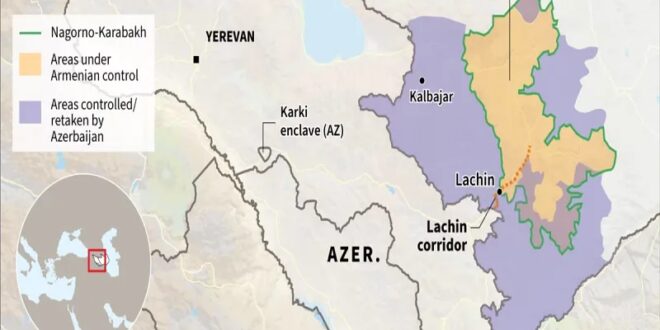It’s in the US’ interests to drag Iran into a protracted 1980s-like war with Turkiye that would bleed both dry while dividing the region. The Islamic Republic mustn’t fall for the unprecedentedly dangerous geostrategic trap that’s been set for it.
Tensions are soaring in the South Caucasus after Armenia and Azerbaijan accused one another of preparing for a new conflict over Karabakh. Amidst these dangerous dynamics, Russian-Armenian relations have soured as Yerevan pivots towards the West after realizing that it’ll never trick Moscow into waging war against Azerbaijan. The Russian Foreign Ministry reacted to this by summoning the Armenian Ambassador to complain about his country’s spree of unfriendly steps over the past week.
The West is exploiting ultra-nationalist sentiment in Armenia to provoke a major conflict along Russia’s southern periphery with the expectation that Moscow would either get dragged into the fray due to its mutual defense commitments to Yerevan via the CSTO or discredit the aforesaid bloc by staying neutral. The second scenario is most probable since Russia doesn’t want to divert any of its forces from the special operation and is also worried about risking a war with Azerbaijan’s Turkish ally.
The abovementioned calculations explain why the Kremlin will likely settle for discrediting the CSTO as the “lesser evil” in response to the dilemma that the West is creating for it. Iran would do well to follow Russia’s lead and avoid getting dragged into any new conflict over Karabakh, though it remains unclear how Tehran would react if another war breaks out. This uncertainty is due to reports that it warned Azerbaijan against attacking Armenia and the IRGC’s latest video signaling its intent to aid the latter.
Advocates of intervention argue that Azerbaijan is an Israeli puppet that needs to be taught a lesson. They also add that the Zangezur Corridor that Baku envisages launching across Armenia’s southern Syunik Province would supercharge Turkish influence along Iran’s northern periphery in the South Caucasus and Central Asia, hence why the Islamic Republic must supposedly intervene to stop it. Both of these arguments are fallacious as will now be explained.
While “The Azerbaijani-Israeli ‘United Front’ Against Iran Raises Some Serious Questions”, nobody should be deceived by anti-Zionist demagogues into thinking that Azerbaijan is Israel’s puppet. The preceding hyperlinked analysis details the reasons between those two’s de facto alliance by emphasizing their shared regional security concerns. Azerbaijan has the sovereign right to cultivate ties of any nature with whoever it wants and has proven its independence by not sanctioning Russia despite Western pressure.
As for the second point, Turkiye’s “Middle Corridor” that runs through the South Caucasus and Central Asia is already in effect due to the logistical transit rights it earlier received from Georgia, thus making moot the rationale of Iran aiding Armenia in order to stop Azerbaijan’s Zangezur Corridor. It’s true that that spread of Turkish influence across those regions would accelerate if this project enters into fruition, but Iran is unable to stop this overall trend, only possibly slow it down but at massive cost to itself.
Segueing into the consequences of militarily intervening in Armenia’s support, the most obvious is that Iran would risk a two-front war with Azerbaijan and its Turkish ally. Since the latter is a member of NATO and has the bloc’s second-largest military, the Islamic Republic would have to brace itself for an intense and potentially protracted conflict that could resemble the one that it last fought with Iraq in the 1980s. Suffice to say, the humanitarian and economic impact would be similarly devastating.
Furthermore, Iran would be aiding the West’s newest ally in the region after Armenia just de facto defected from Russia’s CSTO, and this could sully the anti-imperialist reputation that it’s built since 1979. The legal pretext being bandied about by supporters of an intervention claiming that Tehran must ensure the integrity of Armenia’s borders is identical to the “rules-based order” rhetoric spewed by the US. It’s also hypocritical when remembering Iran’s occupation of Iraq’s Al-Faw Peninsula in the late 1980s.
Back then, Iran pushed back the Iraqi invaders and went on the offensive in order to ensure its objective national security interests. Azerbaijan might be tempted to do something similar in Armenia’s Syunik Province if hostilities reignite. Just like Iraq invaded Iran for ethnically driven irredentist reasons after taking advantage of the tumult that accompanied the Islamic Revolution, so too did Armenia invade Azerbaijan for the exact same reasons after taking advantage of the Soviet Union’s collapse.
Considering the fallacious nature of the arguments agitating for an Iranian intervention in Armenia’s support and the disastrous consequences that could occur if that happens, Tehran should think twice about the wisdom of embroiling itself in another Karabakh Conflict. It’s in the US’ interests to drag Iran into a protracted 1980s-like war with Turkiye that would bleed both dry while dividing the region. The Islamic Republic mustn’t fall for the unprecedentedly dangerous geostrategic trap that’s been set for it.
 Eurasia Press & News
Eurasia Press & News



